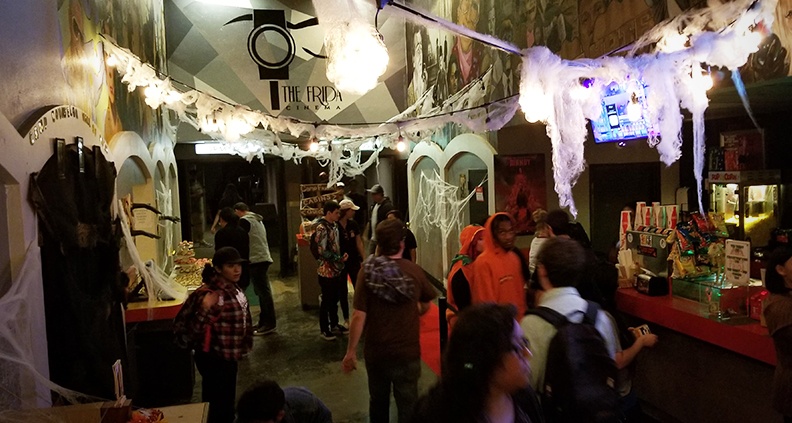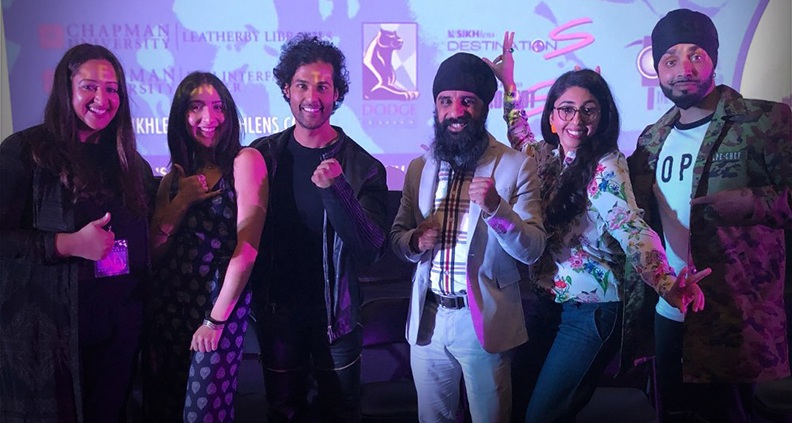Theater Crawl: Santa Ana’s Frida Cinemas is the King of the O.C. Art House
As the seagull flies, Orange County is just 43 short miles from the heart of Hollywood. But culturally and ideologically it can often seem like an entire world away—or at least that’s the common perception among nose-in-the-air Angelinos who’d never be caught dead South of the 10 (much less the 91.) In truth, the O.C. has tons to entice the voraciously curious culture vulture. And for our particular subset of ravenous cinephiles, Ground Zero of Orange County’s blossoming film community is The Frida Cinema located in downtown Santa Ana, CA—a lively, forward-looking organization and classic art house, in every sense of the word.
Boasting two theaters with a 210-seat capacity each, The Frida was founded in 2014 by Executive Director Logan Crow—a longtime film lover and programmer on LA’s crowded revival scene, who was looking for a permanent physical home for his increasingly robust slate of curated screenings and special events. Taking control of a defunct mini-multiplex in the center of culturally diverse Santa Ana, The Frida—which recently celebrated its fifth birthday—has since become Orange County’s undisputed hub for adventurous, elevated cinephelia.
We recently talked to Crow about all things art house—from The Frida Cinema’s mission, to programming successes and failures, the difficulties of operating as a nonprofit arts organization, Monty Python and a whole lot more.
THE FRIDA CINEMA

So how long has The Frida Cinema been in business? And do you have any particular mission statement?
Crow: We just celebrated our fifth anniversary! We opened doors on February 21, 2014. Our mission is “Enriching, connecting, and educating communities through the art of cinema.” We also proudly adopt the definition of an “Art House Cinema” as defined by the Art House Convergence: to serve as “a mission-driven, community-based theater that exists for the love of cinema.”
Tell us a little bit about the neighborhood or city you’re in.
Crow: Our cinema is located in the heart of Downtown Santa Ana, which is a fantastic and diverse community with a truly amazing entrepreneurial and creative vibe brimming with artists, galleries, concert venues, great independent restaurants and so many collaborative projects and events. We’re located in the middle of quite a few educational institutions with great film departments so we get a lot of student filmmakers who showcase their films here and who join us as volunteers. As the sole nonprofit art house in Orange County, a lot of local filmmakers have made a home out of our space.
What is some of the regular programming that you do?
Crow: We keep the programming pretty diverse month after month. But we have three monthly series that we regularly incorporate into our programming: “The Directors,” which presents four-to-five titles by a single filmmaker throughout the month; “Frida After Dark,” which presents horror classics and other offbeat titles late-nights on weekends; and our “Volunteer of the Month Pick,” for which we allow our Volunteer of the Month to program any film they choose. That one has yielded some interesting results—like L’Atalante and Network. We also host two overnight marathon events each year: “Starship Frida,” an all-night sci-fi marathon, and “Camp Frida,” a summer camp-themed horror marathon.

What films have been unexpectedly successful? And have there been films that you have programmed that you wish did better?
Crow: Mandy. Seriously—we could never have anticipated how successful Panos Cosmatos’ Mandy would be for us. It’s definitely one that I hunted down, kept my eye on for months and jumped on as soon as I found out a distributor had been named. It looked gorgeous, it looked insane and we had heard from quite a few people who were as desperate to watch it as we were. So when we locked it in, we promoted it like crazy. The tickets started selling, and just didn’t stop. I generally hold onto a movie for a week. On rare occasion if a film does very well, I do what we can to hold it a second week. Mandy is only our second movie—after the Korean zombie film Train to Busan—that I held three weeks. As far as a film that we wish would’ve done better? I’d say Rainer Sarnet’s November. What a strange, peerless beauty that film is. I wish it had done better because, even if everyone reading this went out and watched it today, they’d have missed the experience that was experiencing it on the big screen. But see it anyway!
What are some of the biggest challenges you face in running an independent art house theater?
Crow: Funding. Absolutely funding. We’re an arts-and-culture nonprofit, but we’re also a cinema. From time to time, people ask questions like: “If you sell tickets, why do you need to raise donations?” I don’t think it’s a question that same person would ask a museum, which also sells tickets. The culture of philanthropy isn’t as ingrained in a theatrical setting. We’re very much a museum of cinema—we curate, with intent and a passion for the medium, the art that we share with our guests. We hang pictures on walls, too—our pictures just happen to move and make noise for a couple of hours. They too are created by artists to be shared in a cultural institution and studied, discussed and taken in. Our donors ensure that we continue to adopt the Art House model and meet our mission. We need the support of individuals who would get behind that mission to continue to exist.

What’s your approach to social media and marketing?
Crow: Don’t stop! Avoid redundancy by never posting the same image twice. If you follow us on social media, you’ll see we take it pretty seriously. But for me it’s about so much more than being provided with a free platform to share our programming—it gives us an opportunity to connect with our audience and with fellow film lovers. We treat our Facebook Messages the same way we’d treat emails and phone calls. Our response rate is great because we reply every time. Our budget for marketing is pretty much non-existent. I’ve said it before, I’ll say it again: I don’t know if the Frida could have happened quite the way it happened in a time before Facebook. I really don’t. I launched a Facebook page the moment we had decided on a name. We didn’t open until (if memory serves) eight months later. I was already actively building up a following, because I knew we’d need it if we were going to survive longer than a few months. We didn’t have a lot of money when we opened our cinema, but we already had a foundation of followers who were excited about the vision we’d shared.
Have there been any unique or unusual events at your theater?
Crow: There have been so many. We live for the unique and unusual! There’s a podcast called Bombs Away which discusses B-movies and mainstream films that flopped or are considered bombs. They started to do a series of events here where they show the film, then record their podcast live in front of the audience. For the shark movie Deep Blue Sea, they covered every one of our seats with trash bags, then handed every attendant a little pink shark-shaped water gun filled with water. The audience was instructed that every time someone was killed onscreen, they were to shoot their little water guns up in the air.It was amazing! For safety’s sake, it’s not likely something we’d do again, but it was definitely an experience.
Lastly, why do you think the communal theatrical experience is still important?
Crow: I think you said it right there: it’s an experience. You can’t recreate it anywhere else. You think you’ve seen Monty Python and the Holy Grail—maybe you’ve seen it with a bunch of your friends, so you think you’ve seen it communally—and then you watch it in a packed theater. Around you are people who’ve seen the movie a million times, and know it word for word, people who’ve never seen it and are losing their minds to it for the first time, folks who break out in thunderous applause after a scene that’s always struck them as particularly hilarious. Suddenly a film becomes a concert, complete with applause, cheers, lines being shouted out in unison with a performer on screen the same way someone might sing lyrics out along with a performer on stage. Look at The Rocky Horror Picture Show. Introduce yourself to that movie at home and, sure, it’s a good time. Introduce yourself to it in a cinema, you’ve got a lipstick “V” on your head and you’re doing the Time Warp. As long as art houses keep doing what they do best and new generations embrace their local art house cinema, support it and form new connections and experiences there, I truly believe they’ll continue to hand down that experience. And I’m committed to ensuring The Frida Cinema continues to do its part to keep it alive as long as we can.
Past Theater Crawls include…
- Salt Lake Film Society (Salt Lake City, UT)
- The Iowa Theater (Winterset, IA)
- MKE Film (Milwaukee, WI)
- The Loft (Tucson, AZ)
- Park City Film (Park City, UT)
To learn more about the Frida—including what’s playing now and what’s coming soon—check out its website. Do you have a favorite local art house you’d like to see profiled? Leave your suggestions in the comments.
Learn how to become a Member of Film Independent by visiting our website. Be sure to follow us on Twitter, Facebook and Instagram and don’t forget to subscribe to Film Independent’s YouTube channel.